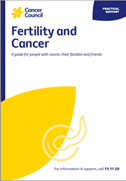- Home
- About Cancer
- Managing side effects
- Fertility and cancer
- Treatment side effects and fertility
- Radiation therapy
Radiation therapy
Radiation therapy (also called radiotherapy) uses a controlled dose of radiation to kill cancer cells or damage them so they cannot grow, multiply or spread. It can be delivered from outside the body (external beam radiation therapy) or inside the body (usually brachytherapy).
The risk of infertility will vary depending on the area treated, the dose of radiation and the number of treatments.
Radiation to the pelvic area and reproductive organs
Radiation therapy to the pelvic area or any of the reproductive organs commonly causes permanent infertility. It may be used for cancer of the bladder, bowel, cervix, ovary, prostate, rectum, anus, uterus, vagina or vulva.
Your treatment team may try to preserve your fertility by shielding or protecting your organs during radiation treatment, but sometimes this is not possible.
| Radiation therapy to the ovaries | This can stop the ovaries producing hormones, and cause permanent menopause. If you need radiation therapy near the ovaries, one or both may be surgically moved higher in the abdomen and out of the field of radiation. This is called ovarian transposition (oophoropexy). |
| Radiation therapy to the cervix or uterus | This can stop the ovaries producing hormones, and cause permanent menopause. Radiation therapy can also permanently damage the uterus, which means you cannot carry a baby. |
| Radiation therapy to the testicles | This can lower the number of sperm and affect the sperm’s ability to work normally. |
| Radiation therapy to the prostate | This may cause erectile dysfunction, which means not being able to get and keep an erection firm enough for penetrative sex. |
| Radiation therapy to the brain | This may damage the pituitary gland, which releases hormones that control reproduction. It tells the ovaries to release an egg each month and the testicles to make sperm. |
| Radiation therapy to the whole body | This is known as total body irradiation (TBI), and may be given before a stem or bone marrow cell transplant to treat blood cancers. Complications such as miscarriage, premature birth and low birth weight are more common with TBI. |
If you have both chemotherapy and radiation therapy (chemoradiation) to treat cancer, the risk of permanent infertility is higher.
→ READ MORE: The impact of surgery on fertility
Podcast: Coping with a Cancer Diagnosis
Listen to more of our podcast for people affected by cancer
More resources
Prof Martha Hickey, Professor of Obstetrics and Gynaecology, The University of Melbourne and Director, Gynaecology Research Centre, The Royal Women’s Hospital, VIC; Dr Sally Baron-Hay, Medical Oncologist, Royal North Shore Hospital and Northern Cancer Institute, NSW; Anita Cox, Cancer Nurse Specialist and Youth Cancer Clinical Nurse Consultant, Gold Coast University Hospital, QLD; Kate Cox, McGrath Breast Health Nurse Consultant, Gawler/ Barossa Region, SA; Jade Harkin, Consumer; A/Prof Yasmin Jayasinghe, Director Oncofertility Program, The Royal Children’s Hospital, Chair, Australian New Zealand Consortium in Paediatric and Adolescent Oncofertility, Senior Research Fellow, The Royal Women’s Hospital and The University Of Melbourne, VIC; Melissa Jones, Nurse Consultant, Youth Cancer Service SA/NT, Royal Adelaide Hospital, SA; Dr Shanna Logan, Clinical Psychologist, The Hummingbird Centre, Newcastle West, NSW; Stephen Page, Family Law Accredited Specialist and Director, Page Provan, QLD; Dr Michelle Peate, Program Leader, Psychosocial Health and Wellbeing Research (emPoWeR) Unit, Department of Obstetrics and Gynaecology, The Royal Women’s Hospital and The University of Melbourne, VIC; Pampa Ray, Consumer; Prof Jane Ussher, Chair, Women’s Health Psychology, and Chief Investigator, Out with Cancer study, Western Sydney University, NSW; Prof Beverley Vollenhoven AM, Carl Wood Chair, Department of Obstetrics and Gynaecology, Monash University and Director, Gynaecology and Research, Women’s and Newborn, Monash Health and Monash IVF, VIC; Lesley Woods, 13 11 20 Consultant, Cancer Council WA.
View the Cancer Council NSW editorial policy.
View all publications or call 13 11 20 for free printed copies.

